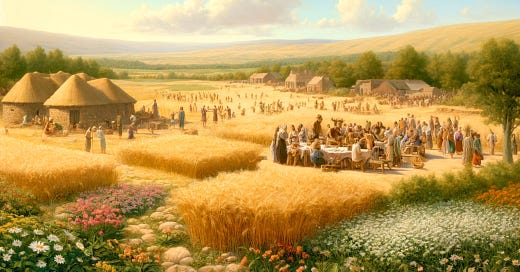Behar - In God We Trust
We must lean on bitachon, active trust in God, to navigate these uncertain times.
As the worldwide rise in antisemitism shows no sign of abating, and the war drags on with our hostages still in captivity, many of us search for explanations about why God has placed the Jewish people in this agonizing situation. I think we should try to find messages in the parsha that can help us cope with the worsening current events.
This week's parsha, Behar, refers to Mount Sinai / Har Sinai, where the Torah says we were commanded to observe the mitzvah of shmita, the sabbatical year.
Rashi poses a famous question:
?מָה עִנְיַן שְׁמִטָּה אֵצֶל הַר סִינַי
What has the matter of the Sabbatical year to do with Mount Sinai that Scripture felt compelled to expressly state where it was commanded? [Rashi on Leviticus 25:1:1]
“What does shmita have to do with Mount Sinai?” This phrase has become popular in Yeshivish circles, humorously used to describe seemingly irrelevant comparisons, comparable to saying "What's that got to do with the price of tea in China?" Rashi's query is more serious though. Why does the Torah begin by mentioning Mount Sinai when presenting the mitzvah of Shmita? After all, many sources, including the Torat Kohanim quoted by Rashi, suggest that most, if not all the mitzvot were given at Mount Sinai. Why is shmita uniquely called out as having been given to us on Har Sinai? This question has intrigued many Jewish philosophical commentators.
The Chatam Sofer explains that shmita will strengthen our belief that God gave us the Torah at Mount Sinai. Why? Because if you think about it, no human being would have written a law that requires us to leave our land fallow every 7 years and again every 49th & 50th year. The Torah tells us that God anticipated our worried reactions and questioning; after all, He did not even ask us to devise plans for storing food during the other years. He therefore promised to send a bumper crop in the 6th year and a triple crop in the 48th year. Who besides God could make such a bold promise to an entire nation? There is no law like a systematic shmita anywhere in the history of mankind. The Chatam Sofer explains that the mitzvah of shmita inspires emunah, fostering a deep-seated belief in the God of Israel, and the authenticity of the revelation at Mount Sinai.
Nonetheless, in painful times such as these, perhaps we need something more than emunah. In his seminal work, Emunah u’Bitachon, the Chazon Ish explains that bitachon, active trust in God, enables us to apply Emunah to our own lives, in a more practical way.
To illustrate this concept, I often share a story from my time as a Yeshiva student in Israel. At my teacher's behest, I visited a well-known Kabbalist. After bestowing upon me a lengthy blessing, he grasped my arm as I prepared to leave and imparted a profound insight. He explained that the Hebrew word for "worry," "דאגה," is composed of four of the first five letters of the Hebrew alphabet: Aleph, Gimmel, Dalet, and Heh. The only letter missing is Bet, which symbolizes "bitachon," or trust in God, a word that begins with the letter Bet.
"Therefore," he continued, "if you have דאגה, worry, it means you lack bitachon. But if you truly have bitachon, if you trust in God, then you won't have דאגה, you won't worry."
This is the profound message of our parsha. Yes, we have witnessed the miracle of the State of Israel and seen the Torah’s prophecies about exile and survival come to life. Yet, it’s often challenging to apply our Emunah—our foundational faith—to the overwhelming challenges we face today.
In these times of uncertainty and difficulty, we must lean on bitachon, our active trust in God, to navigate our daily lives. This trust means relying on Him through every struggle, and believing He is with us at every moment.
If we hold firmly to our conviction that Israel is our eternal inheritance and trust that God will support us through our trials, He will quiet our fears and strengthen our spirits. By embracing emunah and bitachon, we anchor ourselves in the truths that sustained our ancestors. With this approach, we’ll have the fortitude to confront the complexities of our times and remain steadfast toward a better, more hopeful future.
Shabbat Shalom.
Eliezer Hirsch


